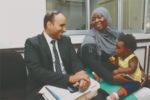Some articles are fairly subtle in their Islamophobia, others less so.
Judy Bachrach’s article “Twice Branded: Western Women, Muslim Lands,” starts off badly and then to proceeds to elicit gasps with its sheer awfulness. It even cites Not Without My Daughter as an accurate depiction of life for most Muslim women. Yes, really. The title itself states how difficult it is to be a white woman in a Muslim (read: non-white) place. Grab an onion, folks, it’s time to cry for the poor white women!
Before we get to that part, Bachrach makes it clear that we must also pity the Muslim women, who she only reads about when they are being harmed by evil Muslim men. No one cares about Muslim women like she does. Apparently Western journalists and politicians never write about them, or at least when they do, they don’t write what she thinks they should.
Except for Mona Eltahawy. Bachrach quotes Eltahawy extensively, because Muslim women are such a homogeneous globule of victimhood that one journalist can speak for us all.
Apparently Eltahawy was sexually harassed while living in Egypt and Saudi Arabia, which means that her experience automatically transfers to the rest of the female population in “Muslim lands.” As we know, bad things only happen to women in Muslim countries; the rest of the planet is a misogyny-free paradise.
Just in case we’re not yet sure why these bad things happen, Bachrach states at length that it the fault of Muslim men, as “this is the way they prefer things to be”. That’s some serious finger-pointing!
However, she wishes to focus on Muslim women in “their home countries”. That’s not the West, by the way. Muslim women obviously aren’t at home there.
She begins her focus by citing an Egyptian survey stating that 62% of Egyptian men had admitted to harassing women. However, she admits that the survey only questioned 2,000 men. As the population of Egypt is some 76.8 million (UN, 2008), this isn’t quite the damning statistic she thinks it is.
Having used a person of color as a mouthpiece and quoted some spurious statistics, Bachrach now moves onto her personal experience of Egypt. She considered herself to have a “double deficit”: being both female and foreign. At this point, the reader may wonder if the “branding” Bachrach speaks of is actually the marks left by the heavy straps of her invisible knapsack, but I digress.
Her harassment was a daily occurrence, made worse by the “entire city of Cairo” being avid watchers of Dallas:
When I lived in Egypt, everyone in Cairo avidly watched the television series Dallas, and as a result became expert on the sexual habits of American women. And not simply expert, but unrepentantly predatory. After all, these were women whose husbands and brothers would not reflexively massacre those who insulted them.
For it wasn’t the shoulder-pad-clad bed-hopping of its cast that made American women in Cairo seem like easy targets, it was the realization that “these were women whose husbands and brothers would not reflexively massacre those who insulted them.”
Reflexively massacre? This must be because Muslim men are such barbarians. Unlike civilized Western men of course, who are lovely to all women, all the time.
Back to how special and wonderful white women are. Local women in Cairo are of “neglible importance”, as if they don’t face any harassment at all. Whereas the exotic foreign woman lacks a “murderous uncle by her side” and is hassled from all sides.
The article then takes a brief detour through the “Married to Muslim Man Misery Memoir”, just in case you haven’t realized yet just how wicked Muslim men are. Bachrach uses “experts” whose reputations precede them: he chats with Phyllis Chesler, a notorious Islamophobe, about why any sane Western woman would marry a Muslim man and move to a predominantly Muslim country. Chesler’s choice quote: “You will live but wish you were dead”. Having spoken to Islamic scholar Hussein Rashid about Qur’anic interpretation and finding him far too positive about his religion, she then turns to that beacon of Islamic learning, Ayaan Hirsi Ali.
Bachrach goes back to playing the role of statistician, reeling off statistics about domestic violence, honor killings and force feedings. Of course none of those are issues that affect Muslims alone, but Bachrach doesn’t let that hold her back.
Following this is much hand-wringing about Muslim women suffering in the West. Apparently, cultural/religious respect is nothing more than post-colonial guilt:
One of the least savory consequences of a colonial past is guilt: an insidious remorse that transmutes itself into a persistent reluctance to criticize publicly those who have now themselves taken on the role of oppressor—even against those who happen to oppress, openly and without shame, within the borders of liberal nations. “You hear people talking about the need to ‘respect’ other cultures. You want me to respect this awful behavior?” Eltahawy says.
The sad part about this is that Judy Bachrach truly believes that she cares about Muslim women. After all, she has visited “Muslim lands” and she speaks to Muslim women.
Why then, does this article seem so laden with grotesque stereotyping? It animalizes Muslim men and infantalizes Muslim women.
This article is not about helping Muslim women, but the author claiming that she knows better, for in her privilege-blinded mind, she is better. She is not saving anyone, just asserting how superior she feels she is.
As a speaker of Arabic, I’m sure she’ll understand me when I say:
La, shukran (No, thank you) .


